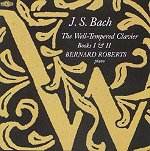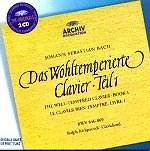This was a popular event at which I found myself out of sympathy. The RFH was almost full and the audience generally appeared content, respectful, appreciative and attentive - a few people left early during the first half, having probably found themselves in the wrong concert! Andras Schiff, who is properly renowned for his Bach playing, rebuked some coughers in a school-masterly fashion during one of the fugues.I have no prejudine against Bach on the piano, indeed I prefer it to harpsichord for this music. In his programme notes he castigates militant 'authenticists' who seek to ban Bach on the piano; are there really any such?
But are these intimate pieces really appropriate for a huge concert hall, however satisfactory for the promoters financially? That is the nub of the problem, which Schiff does not address in his lengthy and thoughtful essay, which traverses many of the issues.
The other question is whether this is good programme planning? 24 preludes and 24 fugues can be a lot to take straight off. Schiff's playing was expressive, but sounded quiet and a little remote at a distance. He was sparing in use of pedal, as he advocates but, despite his writing to the contrary, his approach seemed to be based mainly on legato, which I was had been taught was axiomatic long years ago. Later I have learnt that détaché articulation is more suitable as a basic method to approach music of the period, but this is of course a minefield of controversy.
Whatever - I found these performances unengaging after a few preludes and fugues, too remote in such a large space, and cannot imagine what it sounded like under the overhang in the cheaper seats at the back of the terrace stalls. It was a Sunday afternoon and there is an element of quasi-religious ritual, which hangs over such events, especially in the Bach 250-anniversary year.
This afternoon with Andras Schiff at the RFH certainly served to provoke thought about this towering edifice in the musical canon. The 48 do of course replay endless study at home, whether at the keyboard or on CDs. I was left thinking that one should listen to a few of these pieces from time to time, best at home, and those recordings show how the music can change its sounding, like a chameleon its appearance, with different instruments and artistic personalities. Then, go back to the scores and try to play one or two on whatever instrument you have (I play them, not very well, on both piano and clavichord) - the 48 will survive it all!
Recordings
For the 48 on modern piano, a new bargain-priced 4-CD boxed set by Bernard Roberts for Nimbus, released last year, can be warmly welcomed [NI 5608/11] £18.99. They were recorded at the Nimbus Concert Hall over a three-month period in 1998 and the ambience as captured is just right for intimate, home listening. It is alive and sober, well considered playing by a still somewhat under-rated senior British pianist, supported by a wise and learned 14-page essay (legibly printed in strong black type, but only in English, which might limit sales and inhibit the international hype machinery?). Wilfrid Mellers discusses 'well-tempered', saying that this does not imply 'equal temperament'. 'Appropriate temperament' may be closer to what Bach meant - Mellers scotches the belief that demonstration of the advantage of equal temperament (which irons out the inherent inequalities which give character to different keys) was ever intended by Bach, who tuned his instruments, very quickly, before playing. He discusses Landowska's recording on her mammoth Pleyel harpsichord and Bach on piano as exemplified by two other 'maverick geniuses' Rosalyn Tureck & Glenn Gould.
The magic of digital reproduction has brought the delights of the clavichord to a wider home-listening audience and there is a welcome reissue of the 1959 Archiv recording on clavichord by the pioneering keyboard player and scholar, Ralph Kirkpatrick [DG 463 601-2] £12.50. Foremost authority on Scarlatti, responsible for the classification of his sonatas in pairs now generally accepted, Kirkpatrick's essay for the LPs, reproduced here, is balanced and a good guide. In a survey of recordings over the years, we are reminded that before the 1950s, when Landowska recorded the 48 on harpsichord, performances of Bach's keyboard music on other than piano or organ were very unusual. Kirkpatrick stresses the importance of playing clavichord recordings quietly, 'never at a level which does not demand full attention', and this intimacy is a rare joy in these noisy times in which we live.Xxxxx Peter Grahame Woolf



 Return to:
Return to: